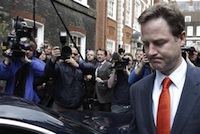
There is scepticism that Liberal Democrat leader Nick Clegg will forge a deal with the Conservatives this weekend after the British election produced a hung parliament.
Putting “a big, open and comprehensive offer” to the Liberal Democrats, Conservative leader David Cameron left open the possibilities of running a minority government or agreeing a coalition deal with Mr Clegg.
Notably, however, the Tory leader made no immediate offer of electoral reform -- unlike Gordon Brown, who remains as British Prime Minister for now.
However, the Conservative leader was put in pole position after his Liberal Democrat counterpart said Mr Cameron had the most votes and seats and now needed to show whether the Conservatives were “capable of seeking to govern in the national interest”.
The parties have deep disagreements on Britain’s role in the European Union. Nick Clegg eventually wants to ditch the pound in favour of the euro, something the Tories vehemently oppose.
And on defence, while Mr Clegg wants to scrap the trident nuclear submarine program, but the Tories are avid militarists.
But it is the first-past-the-post voting system which outrages the Liberal Democrats the most. The inequity of the system was illustrated in an analysis which showed that the Conservatives won a seat for 35,021 votes; Labour won one for every 33,338; but the Liberals secured 119,397 votes for every seat they won.
The smaller parties faced even greater challenges, with the UK Independence Party winning no seats despite receiving nearly a million votes.
Although the North of Ireland is highly unlikely to feature in the talks, developments were being watched closely by political leaders in the Six Counties in the belief they could still have a role to play in the formation of the next British government.
A failure by the Conservatives and Liberal Democrats to reach agreement could open the possibility of a Labour-led government supported by the Liberal Democrats and MPs from parties in the North.
The DUP was said to be eager to enter talks on such a deal, while the SDLP was also talking up the possibility that it could be involved in negotiations. Newly independent North Down MP Sylvia Hermon has already declared for Labour, while the Alliance Party’s new MP in East Belfast, Naomi Long, has been named by commentators as a virtual card-carrying member of the Liberal Democrats.
In contrast, Sinn Fein, which refuses to take its seats at Westminster, has not yet been mentioned by any of the parties in connection with the balance of power in London. After the count in West Belfast, which Gerry Adams won very comfortably, he indicated that his party would hold to its abstentionist position. Earlier in the campaign he had said, “we are not going into Westminster as long we have a mandate not to go in”.
The Conservatives won 306 seats in the London parliament, up 97; Labour won 258, down 91; the Liberal Democrats were down five to 57; the Democratic Unionists down one to eight; and the Scottish National Party, Sinn Fein, (Welsh nationalists) Plaid Cymru and the SDLP were unchanged at six, five, three and three respectively.
The Conservatives have ended up short of a majority, even though they won 500,000 more votes than Labour did under Tony Blair in 2005 when he enjoyed a majority of 67.
The British National Party was given a serious rebuff by voters, losing all its seats on Barking Council in East London, while the party’s leader Nick Griffin was defeated in the House of Commons race there.
Meanwhile, the human rights campaign group Liberty is considering mounting a legal action on behalf of hundreds of British people who were denied their vote on Thursday night, after they were stuck in queues and postal ballots ran out.
Shami Chakrabarti, the group’s director, appealed to people to come forward in what could amount to a group action on behalf of disenfranchised voters. “Shameful scenes of hundreds of voters turned away from polling stations are unworthy of a mature democracy like ours,” she said.
“Liberty will use all legal and campaigning means to ensure that this disgrace is never repeated. This is particularly pressing, given the possibility of further elections in the medium term.” Ms Chakrabarti said the challenge would be based on alleged breaches of human rights, rather than electoral law.
The intervention came amid recriminations over what went wrong on election night. There were angry scenes at polling stations across the country after they were inundated with a high number of last-minute voters. Those responsible for overseeing the voting system, who have been blamed, turned fire on parliament yesterday, accusing politicians of ignoring their pleas for reform.
David Monks, leader of Britain’s returning officers, said: “This is an immensely Victorian system that’s way past its sell-by date, and here we are flogging it in the 21st century. It’s a system that’s not suitable for our lifestyle in the 21st century. We need to look afresh at this and start a new system.
“In some of the close-result constituencies, I think there’s a possibility where they [losing candidates] can say their supporters were turned away. They could build a case to mount an election petition to try and overturn the result.”
In the city of Chester, more than 600 people were unable to vote because the electoral list had not been updated, and Labour won on a majority of 549. Lawyers claimed that people who were unable to vote may be able to claim compensation and challenge outcomes in marginal constituencies.
The outcry has underlined demands for electoral reform and reinforced the belief that a temporary pact and a second Westminster election may be on the cards if, as expected, the Tories and the Lib Dems fail to forge a programme for government.
![[Irish Republican News]](https://republican-news.org/graphics/title_gifs/rn.gif)
![[Irish Republican News]](https://republican-news.org/graphics/title_gifs/harp.gif)

